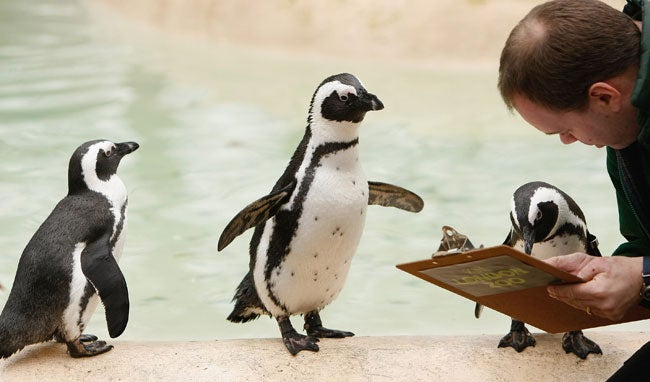A massive stock-taking of the nation's zoo life is proving to be a bit of a headache
It's time for a government audit of all of Britain's zoo animals. But how do you p-p-p-pick out a penguin from his peers? John Walsh investigates

Noah, by contrast, had an easy time of it: all he had to do was find all the animals in the world and select two of each species (and then build an ark). For the brotherhood of British zoo-keepers, things are more complicated. In the next few weeks, they must provide an inventory of every animal, bird, fish and insect held in captivity in the UK. That means, not only identifying which animals inhabit which zoos, but counting to see how many do so.
It's a massive stock-taking of the nation's zoo life, required by law under the Zoo Licensing Act which governs all zoos and aquaria. And while it's a doddle counting the elephants, gorillas, sharks and rhinoceroses (or the penguins being counted at London Zoo) spare a thought for Mr Warren Spencer, curator of invertebrates at Bristol Zoo Gardens, who is faced with the task of counting every member of the 67 different species in Bug World.
Mercifully, Mr Spencer needn't count every ant and flea – groups of them are assessed en masse as a single colony – but every larger bug, every ladybird and stick insect, must be entered on his clipboard, along with details of whether they're at the egg, larva or adult stage. Enumerators in reptile houses will face the problem of determining if there are two chameleon snakes, or three or none at all in the glass cases (and won't there be something ironic about trying to count the adders?).
In the world of aquaria, the toughest challenge is not identifying the translucent jellyfish, but counting shoals of tiny, identical fish. Using rapid-click counters and counting the little blighters seven or eight times appears to be the answer.
And when all the stock-taking is done, the inventories are sent to a database called the International Species Information System (Isis), a clearing-house of data and conservation strategies, through which zoos can run scientifically based breeding programmes that will be a boon to mankind. And if you know anyone who's longing to find out if there's a lesser-spotted, ruff-necked Hela monster somewhere in the Guildford area, his troubles may be at an end.
Subscribe to Independent Premium to bookmark this article
Want to bookmark your favourite articles and stories to read or reference later? Start your Independent Premium subscription today.

Join our commenting forum
Join thought-provoking conversations, follow other Independent readers and see their replies